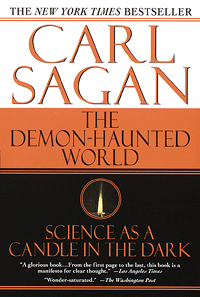This book was required reading for the following courses: (1) “Skepticism 101: How to Think Like a Scientist Without Being a Geek” taught by Michael Shermer, (2) “Weird Science” taught by John Donovan, (3) “The Scientific Method: Critical & Creative Thinking” taught by Stephen Sekula et al., and (4) “Studies in Behavior: Critical Thinking” taught by Evelyn Buday.
“The great astronomer and science writer challenges New Agers and explains social phenomena like UFOs, alien abductions, recovered memories, satanic cults, witch crazes, hallucinations, and how to detect baloney. This is Sagan’s most popular book among skeptics, filled with quotable maxims, popular among college professors as a supplemental text for students, but a classic for everyone who cares about living in a sane and safe world without superstition.”
“Eminent Cornell astronomer and bestselling author Sagan debunks the paranormal and the unexplained in a study that will reassure hardcore skeptics but may leave others unsatisfied. To him, purported UFO encounters and alien abductions are products of gullibility, hallucination, misidentification, hoax and therapists’ pressure; some alleged encounters, he suggests, may screen memories of sexual abuse. He labels as hoaxes the crop circles, complex pictograms that appear in southern England’s wheat and barley fields, and he dismisses as a natural formation the Sphinx-like humanoid face incised on a mesa on Mars, first photographed by a Viking orbiter spacecraft in 1976 and considered by some scientists to be the engineered artifact of an alien civilization. In a passionate plea for scientific literacy, Sagan deftly debunks the myth of Atlantis, Filipino psychic surgeons and mediums such as J.Z. Knight, who claims to be in touch with a 35,000-year-old entity called Ramtha. He also brands as superstition ghosts, angels, fairies, demons, astrology, Bigfoot, the Loch Ness monster and religious apparitions. (Feb.)”
BUY THIS BOOK
from Shop Skeptic
Resource type: book recommendations
Academic discipline: history • philosophy
Academic level: college and university • secondary









